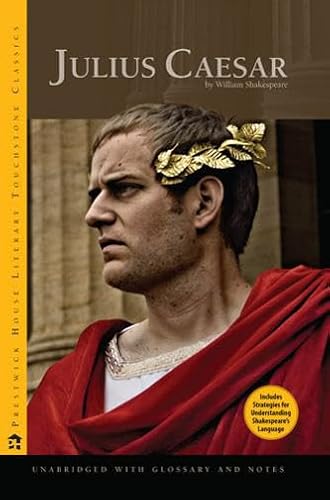Julius Caesar
William Shakespeare
BOOK REVIEW

In the labyrinth of historical dramas, Julius Caesar emerges not just as a play, but as a powerful meditation on the fragility of power, loyalty, and the human spirit. Shakespeare, the bard of Avon, does not merely recount the assassination of a great leader; he delves deep into the cataclysmic consequences that reverberate through the hearts and minds of those involved. This iconic work, penned in the early 17th century, remains a timeless exploration of betrayal and honor that resonates profoundly even in today's tumultuous political landscapes.
Imagine standing in the shadow of the Roman Republic, where the streets buzz with political fervor and whispers of ambition. As Brutus grapples with his loyalty to Caesar against his love for Rome, you cannot help but feel the weight of his moral struggle. The conflict within him is palpable, a reflection of the democratic ideals tearing at the fabric of society. Love, friendship, and duty intertwine in a dangerous dance, leaving you on the edge of your seat, wanting to scream at Brutus to heed the warnings.
Shakespeare's craftsmanship is unparalleled. His words resonate with a visceral intensity that pulls you into the chaos. From the foreboding warnings of the Soothsayer to the haunting dream of Calpurnia, the tension mounts like a tempest ready to unleash its fury. You're not just observing history; you are swept into the very currents of ambition that propel men toward both greatness and ruin. The classic line, "Et tu, Brute?" sends shivers down your spine, encapsulating the raw betrayal that shakes the foundation of loyalty. 🤯
As the political machinery grinds into action, each character presents a compelling aspect of human nature. Cassius, the envious mastermind, and Mark Antony, the shrewd opportunist, serve as mirrors reflecting our darkest impulses. The manipulation of public opinion, the art of rhetoric, and the stark contrast between appearances and reality drive home the play's relevance. Shakespeare warns us of the intoxicating power of persuasion, a reminder that the greatest of leaders can also be the most vulnerable to their own flaws.
The beauty of Julius Caesar transcends its historical setting, challenging contemporary audiences to confront the darkness that lurks in the corridors of power. In an age of disillusionment and polarization, the play's exploration of the delicate balance between liberty and tyranny becomes a chilling reflection of our times. Critics and readers alike have echoed this sentiment, with one declaring it "a vivid warning of the perils of power unchecked." Others have marveled at how the themes resonate with modern governance, questioning whether we have learned from the past.
Notably, the influence of this masterpiece is woven into the very fabric of literature and drama, inspiring countless adaptations across mediums-from films to modern novels. Directors have picked apart its nuances, portraying Caesar not just as a tragic hero but as a flawed figure whose death ignites chaos. The ripple effect of his assassination acts as a mirror, reflecting our collective struggles with authority, justice, and the ethics of power.
Yet, in the hearts of audiences, the play elicits a potent mix of admiration and dread. How many times have we witnessed the tragic downfall of leaders in our own world, echoing the catastrophe of Rome? How often do we find ourselves questioning allegiance-caught between what is right for individuals and what benefits the collective? The chilling reality is that we are all potential Brutus', faced with choices that could tilt the balance of morality forever.
Sure, if you venture into the pages of Julius Caesar, you may find the language antiquated or challenging, yet therein lies the beauty of Shakespeare's work-the challenge sharpens the senses and forces deeper reflection. It's a testament to the enduring power of words and the human experience.
So, if you haven't yet journeyed through this dramatic tapestry woven by Shakespeare, the time has come to confront the ghosts of ambition, betrayal, and glory. Embrace this work, lest you risk missing out on the lessons it still has to teach. After all, in the battle for history's narrative, there's nothing quite like Julius Caesar to remind us of the profound effects of our choices in the theater of power. ✨️
📖 Julius Caesar
✍ by William Shakespeare
🧾 96 pages
2005
#julius #caesar #william #shakespeare #WilliamShakespeare